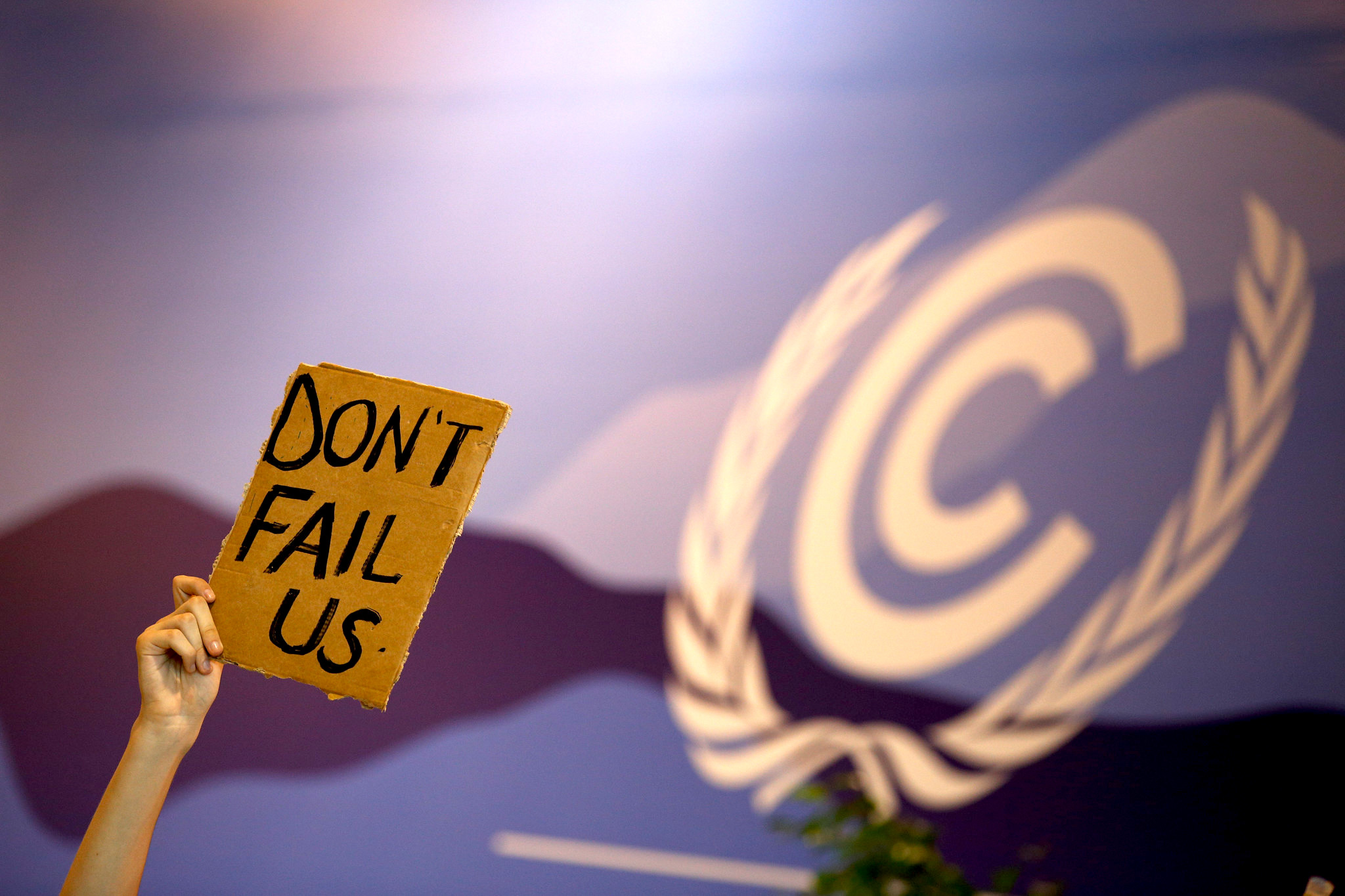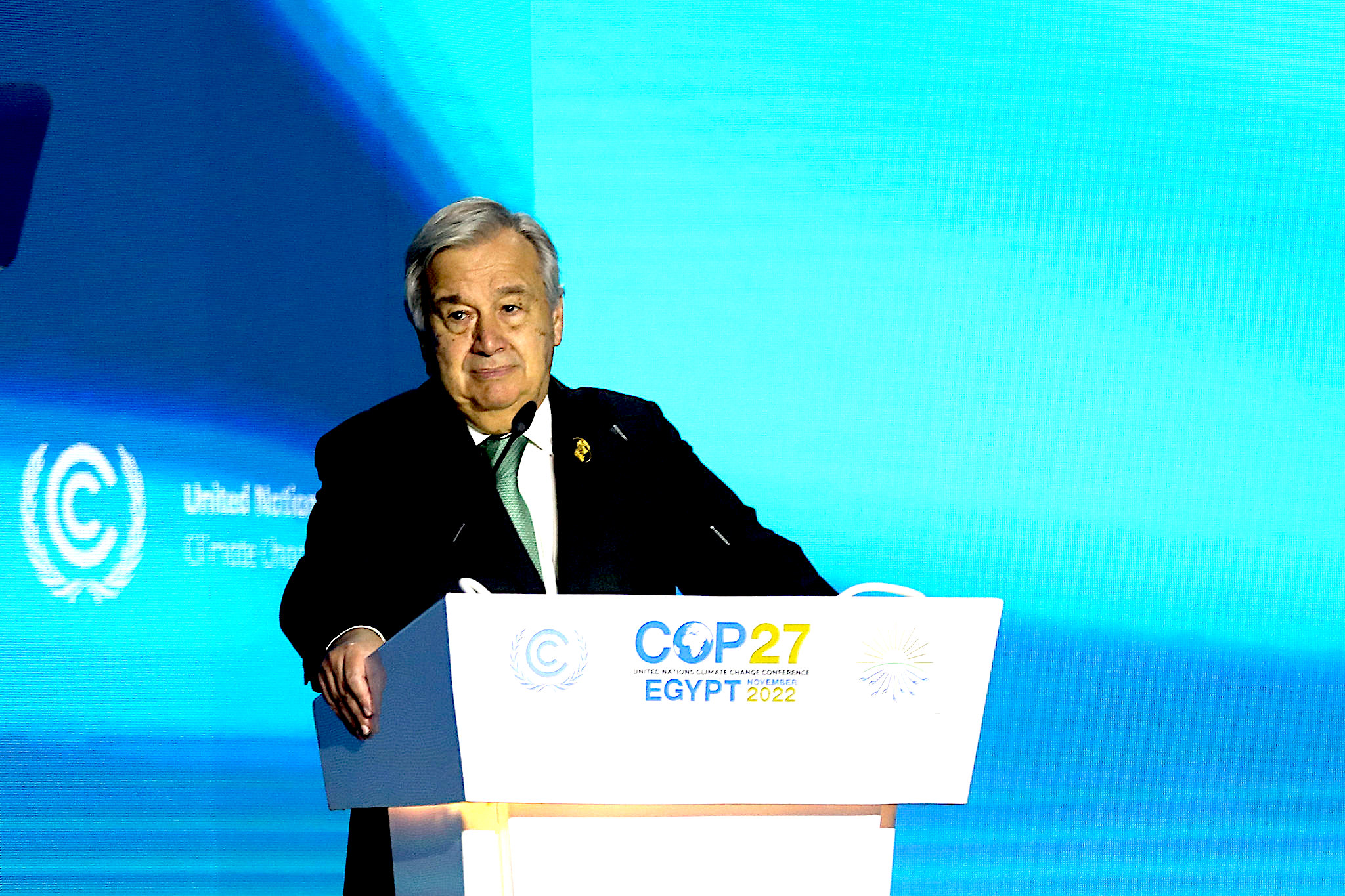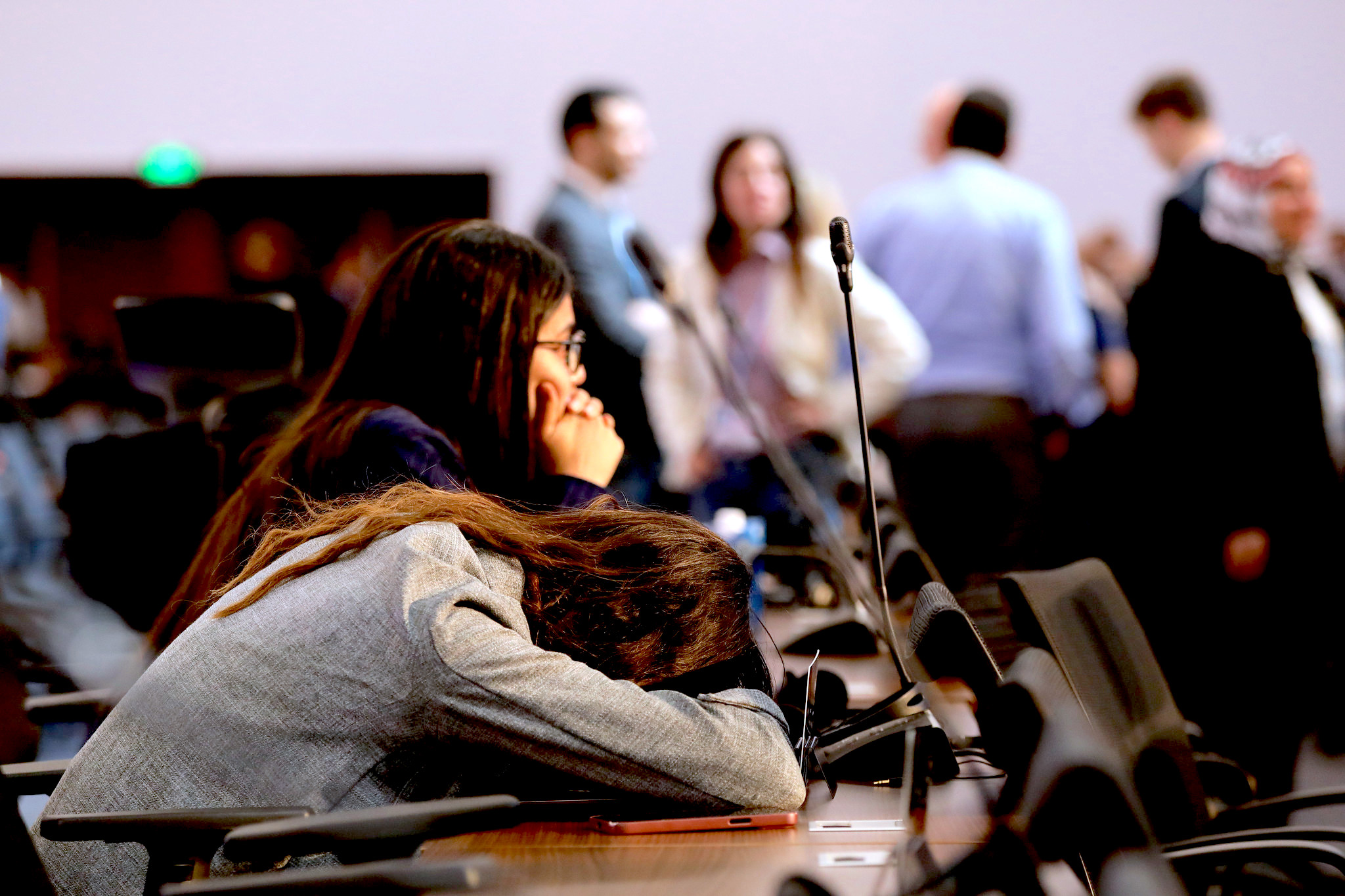“A suicide pact.” Robert Sandford skewers the latest U.N. climate summit, held last month in Egypt, and calls for a new process protected from the global fossil fuel cartel.

Activist’s message to COP27 delegates in Sharm el-Sheikh, Egypt, November 2022. (UNclimatechange, Flickr)
By Robert Sandford
Inter Press Service
 Last year’s climate COP26 in Glasgow, Scotland, was billed as the most important conference in the history of humanity. But it failed to deliver. If anything, that failure added urgency for global climate action at COP27 in Egypt last month.
Last year’s climate COP26 in Glasgow, Scotland, was billed as the most important conference in the history of humanity. But it failed to deliver. If anything, that failure added urgency for global climate action at COP27 in Egypt last month.
Now that this year’s COP is over, it is useful to reflect on a few excerpts from U.N. Secretary-General Antonio Guterres’s opening day remarks:
“These climate conferences remind us that the answer is in our hands and the clock is ticking. We are in the fight of our lives, and we are losing.
Greenhouse gas emissions keep growing, global temperatures keep rising … and our planet is fast approaching tipping points that will make climate chaos irreversible.
We are getting dangerously close to the point of no return. And to avoid that dire fate all countries must accelerate their transition now, in this decade.”
Humanity has a choice: cooperate or perish.
It is either a climate solidarity pact, or it is a collective suicide pact.”
Sadly, COP27’s outcomes make very clear that the world signed on to the one the global fossil fuel sector wanted: the suicide pact.
COP 27 did not deliver. In fact, it has been labelled by many as the worst COP ever.

U.N. Secretary-General Antonio Guterres delivering opening day remarks on Nov. 7. (UNclimatechange, Flickr)
What happened in Egypt puts a whole new spin on the term COP-out. But how could it have been otherwise?
COP 27 was held in a country aligned with surrounding petrostates ruled by a ruthless dictatorship and was sponsored by one of the world’s largest plastic polluters: Coca-Cola.
It did not seem to register with organizers that the company’s relentless bottled water production is widely held in the global water science and policy community as a triumph of marketing over common sense.
Did the organizers not see that Coca-Cola’s sponsorship of COP27 was an open invitation to blatant global greenwashing?
The obvious should not be missed here: Capitalism is not out of control, capitalism is in control — and COP 27 offers clear proof of that truth.
Donate Today to CN’s
2022 Winter Fund Drive
As society’s reliance on petroleum grew and our energy demands expanded, the global fossil fuel cartel quietly evolved into a superpower unto itself. There were more than 600 fossil fuel lobbyists at COP 27. What, one might reasonably ask, could possibly go wrong? Lots, evidently.
The oil-and-gas lobby completely corrupted the COP process. The proceedings and outcomes of COP 27 make it clear that the fossil-fuel sector now owns the COP agenda. The sole aim of their presence there was to prevent, not promote, progress on dealing with the global climate threat. And they succeeded.

Closing plenary session of COP27 on Nov. 20. (UNclimatechange, Flickr)
None of the agreements negotiated in Egypt are binding. Like the national emissions reductions target put forward by U.N. member states under the Paris Climate Accord, the commitments made at COP27 are all merely aspirational.
There is no penalty for failing to achieve them. There have been 27 COPs since 1995 and still no formal binding agreement on cutting fossil fuel burning.
Except for a small blip during the pandemic, fossil fuel burning globally continues to rise, not fall.
As one participant pointed out, the aspirational scheme agreed upon in Sharm el Sheikh is a down payment on disaster. No one expects anyone to actually compensate developing countries that contribute little to the climate threat for the catastrophic impacts climate breakdown is now having on them.
With COP28 scheduled to be held next year in the United Arab Emirates — one of the most notorious petrostates of them all — the only thing COP 27 accomplished was to expose what the COP summit process has become – a pointless travelling circus set up once a year out of which little but platitudes emerge.

Scene from COP27 venue on Nov. 19. (UNclimatechange, Flickr)
The entire COP process is no longer fit for purpose. It is a bloated, corrupted process too moribund to come up with any measures effective enough, and binding enough, to bring about the changes we need to make to avoid climate catastrophe.
Voices calling for change get louder and louder. The COP process must be replaced with something more efficient that does its work largely hidden from the glare of the media.
It can no longer be allowed to be contaminated by corporate sponsorship. The process can no longer be allowed to be owned and corrupted by the global fossil fuel cartel and oil and gas sector lobbyists.
One suggested way of doing this is to establish an IPCC-like structure of smaller bodies, each addressing key issues, notably energy transition, restorative agriculture, transportation and issues related to damage and loss.
Each such body would be made up of representatives of majority-world countries empowered to negotiate legally binding agreements that are workable and achievable, whether it be halting and reversing deforestation, cutting carbon dioxide and methane emissions, drawing down coal use and addressing other threats to our future such as ocean acidification and deoxygenation.
These agreements can then be signed off by world leaders without the need for the hype, grandstanding and false hope now associated with COP process pronouncements.
We are witnessing a great bonfire of our heritage. Things are being lost that have not yet been found. We need to find them before they, and we, are gone.
Robert Sandford holds the Global Water Futures Chair in Water and Climate Security at the United Nations University Institute for Water, Environment and Health, based at McMaster University, Hamilton, Canada.
This article is from Inter Press Service.
The views expressed are solely those of the author and may or may not reflect those of Consortium News.
Donate Today to CN’s
2022 Winter Fund Drive


Why the insistence on inviting those who are the worst polluters – and their lobbyists, to these events? This should be ‘by the people, for the people’ – not ‘by the money for the money’. Are we ordinary ‘sheeples’ invited to attend WEF?
perhaps, instead of a COP, which gather the most idiotic political and economic figures, each year UN or other organizations should held an online conference in which “THE PEOPLE” around the world could participate, in which they will be informed and given the opportunity to decide what action to take for the sake of their own future and own children’s future; it is useless to rely on our “leaders” to change the political/economic environment that has made them rich, powerful and influential. The “democratic process” must be brought a the global level transcending identity, race, and national affiliation… could that be possible?
“… a pointless traveling circus …” That sums up all these global roundups whether ecological or economic in nature. We don’t need to jet across the planet to solve the problem. We need local frameworks that focus on one simple guiding principle. Heal thyself. Are we contributing to the health of all that is or perpetuating a severely flawed system based on exploitation?
I would say it’s exactly opposite. Healing thyself and working on local community sustainability is enriching and laudable- but the eco crisis is global and the primary causes are global too. While it is extremely unlikely to happen, the only cogent solutions involve imposing restrictions on extractive and emission activities across international borders. Of course, we would need governments separate from and capable of imposing restrictions on global capital, and with the vision to undertake the enormous task of restructuring the economies of the world towards an equilibrium state- and all very fast. The political will and underlying mass psychology isn’t there for this, but that’s the necessary course IMO.